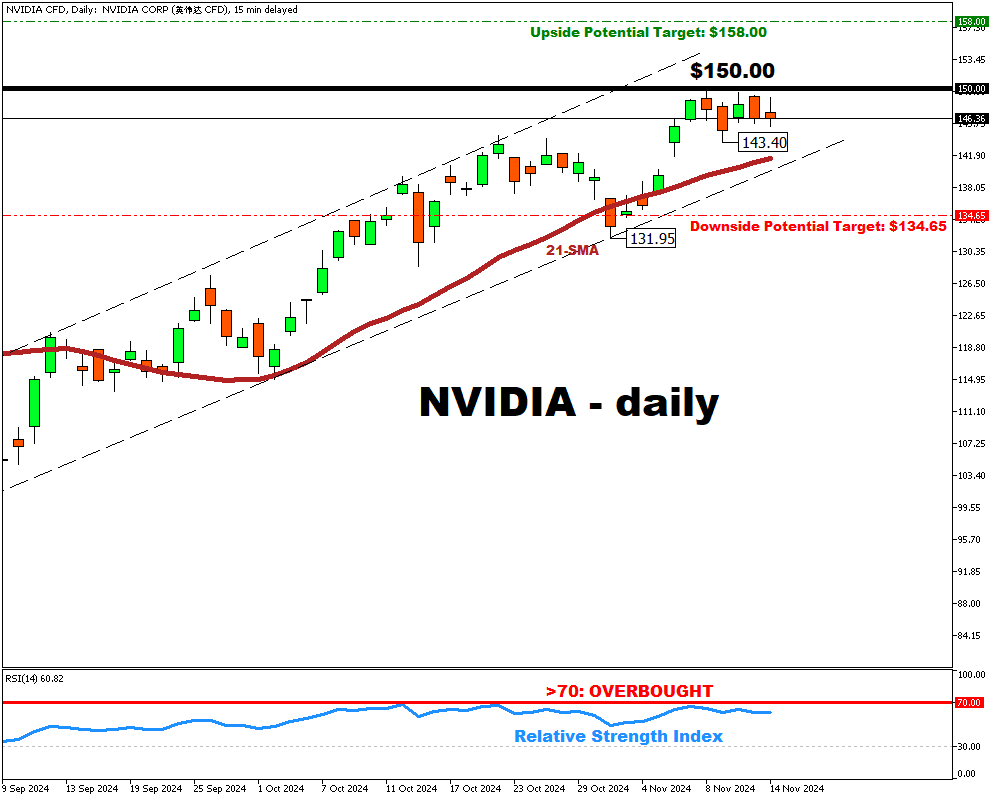-
Nvidia: world’s largest company with US$3.6 trillion market cap
-
Shares already soared 196.3% so far this year
-
Earnings due after US markets close Wed, Nov 20
-
Shares forecasted to move 8% up/down Thur, Nov. 21
- Nvidia accounts for 15% of total global stock volatility
The world’s most-valuable company is about to unveil its latest quarterly earnings.
And when Nvidia speaks, stock markets worldwide listen, and react.
After all, Nvidia alone accounts for about 15% of the total volatility for stock markets worldwide.
Here are some other facts you may not know about this AI-posterchild:
-
Nvidia became the largest company in the world since November 5th – US election day.
(it previously held that title for just 1 day, on June 18, 2024, when it briefly surpassed Apple's market cap).
-
Nvidia is valued (market cap) at US$3.6 trillion at the time of writing (before US markets open on Friday, Nov. 15th).
- Nvidia has almost tripled (+196.35%) so far in 2024, making it the:
- best-performing stock on the Nasdaq 100
- 3rd biggest year-to-date gainer on the S&P 500 (after Vistra Corp’s +260% and Palantir’s +245%).
Why has Nvidia's stocks skyrocketed?
Answer = AI-mania.
Nvidia's GPUs are sorely needed by many tech companies around the world to fuel their respective AI ambitions.
Microsoft, Alphabet, Meta, and Amazon combined are expected to spend US$200 billion this year alone on capital expenditures, including AI spending.
UBS Wealth Management predicts that AI-spending by Big Tech companies could even reach US$266 billion in 2025!
All that has translated into massive revenue and profits for Nvidia, which could grow even more in the years ahead.
Nvidia earnings due Wednesday, Nov. 20th
With all of that in mind, no surprise that traders and investors around the world are bracing for this high-impact event in the middle of a relatively light week on the global macroeconomic calendar:
Monday, November 18
- SG20: Singapore October external trade
- THB: Thailand 3Q GDP
- USDInd: Speech by Chicago Fed President Austan Goolsbee
Tuesday, November 19
- AUD: RBA policy minutes
- EU50 index: Eurozone October CPI (final)
- CAD: Canada October CPI
Wednesday, November 20
- JP225 index: Japan October trade balance
- CNH: China loan prime rates
- GBP: UK October CPI, PPI
- ZAR: South Africa September retail sales; October CPI
- TWN index: Taiwan October exports
- Nvidia earnings
Thursday, November 21
- NOK: Norway 3Q GDP
- EUR: Eurozone November consumer confidence
- ZAR: South African Reserve Bank rate decision
- Baidu earnings
- US30 index: US weekly initial jobless claims; speeches by Cleveland Fed President Beth Hammack and Chicago Fed President Austan Goolsbee
Friday, November 22
- JPY: Japan October national CPI; November PMIs
- AU200 index: Australia November PMIs
- GER40 index: Germany/Eurozone November PMIs
- UK100 index: UK November PMIs and consumer confidence; October retail sales
- TWN index: Taiwan October jobless rate
- CAD: Canada September retail sales
- RUS2000 index: US November PMIs, consumer sentiment (final)
- MXN: Mexico 3Q GDP
Nvidia earnings: What to look out for
Here are Wall Street’s forecasts for some of Nvidia’s crucial Q3 financial figures:
-
Revenue: US$ 33.2 billion
-
Data Center revenue: US$ 29.1 billion
-
Gross profit margins: 75.5%
-
Net profits: US$ 18.54 billion
- Earnings per share (EPS): $0.74
More importantly, given the forward-looking nature of financial markets (today’s prices reflect tomorrow’s hopes) …
Traders and investors are set to pay more attention to Nvidia’s guidance for future earnings.
For context, Nvidia’s Hopper GPUs have been a reliable engine for past and present earnings.
Nvidia's revenues for the current 2025 fiscal year is expected to reach $125.6 billion - double from the previous fiscal year.
However, Nvidia’s much-hyped Blackwell GPU family, despite a slight hiccup, appears to have overcome its recent delays.
That's set to drive another 44% year-on-year climb for Nvidia's revenue, reaching $181 billion for its 2026 fiscal year.
In short, markets are desperate to find out whether all is well with Blackwell (pun intended).
Blackwell Timeline:
-
Q4 2024: Blackwell GPUs to start shipping out
-
2025: Blackwell production set to increase
- Q1 2026: Blackwell GPUs forecasted to reach max output levels
How might Nvidia’s stocks react?
When US markets reopen on Thursday, November 21st, Nvidia’s shares are forecasted to move 8%, either up or down.
Of course, whether this stock climbs or falls will depend on Nvidia’s past and future earnings.
Nvidia’s stock prices could soar to a new record high if CEO Jensen Huang can further stoke market excitement with more details about its Blackwell ramp up in the years ahead.

Potential Scenarios
Using prices at the time of writing (before US markets open on Friday, November 15th) …
-
an 8% upside could see Nvidia’s share price touching $158 next week for the first time in its history!
- an 8% drop could see this stock faltering back into the mid-$130 region.
Given Nvidia’s already stunning surge so far this year, the bar has been set high for already hard-to-impress investors.
Recall that investors were left disappointed with Nvidia’s previous quarterly earnings announcement, resulting in a 6.4% drop on August 29th - the day after its last earnings release
If that sentiment is felt once more, that could translate into broader declines for US stock markets as well (watch the US500 and NAS100 stock indexes in particular).
For the longer term, Nvidia’s stocks are predicted to climb another 7.3% from current prices to eventually touch $157.73 over the next 12 months.
Of course, the above forecast is based on Bloomberg’s survey of Wall Street analysts prior to the upcoming earnings.
Should the AI-mania get another shot in the arm following Nvidia’s earnings, that $157.73 target price may be breached even by this Thursday.
And that would force Wall Street experts to scurry about making upward revisions to their 12-month target prices yet again, as they have done for much of the past couple of years.